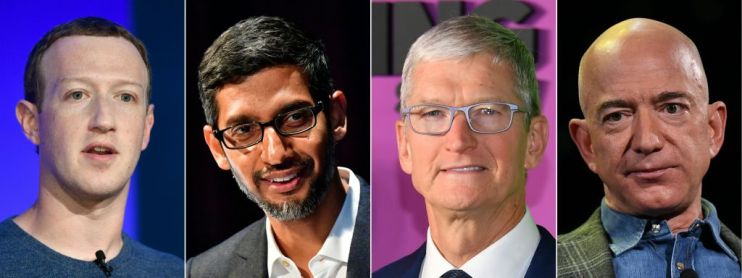Big tech faces break-up as Amazon, Apple, Facebook and Google accused of ‘monopoly power’

Amazon, Apple, Facebook and Google have all abused their market power and could face a potential break-up, according to a damning new report backed by US Democratic politicians.
In a 449-page recommendation released yesterday, the US House Antitrust Committee set out a roadmap for cracking down on the tech giants.
The report follows a 16-month congressional investigation into concerns the firms violate US antitrust laws.
It said: “By controlling access to markets, these giants can pick winners and losers throughout our economy. They not only wield tremendous power, but they also abuse it by charging exorbitant fees, imposing oppressive contract terms, and extracting valuable data from the people and businesses that rely on them.”
The committee said Facebook had “maintained its monopoly through a series of anti-competitive business practices”, including buying up potential rivals and choking off competition.
The report slammed Facebook’s “sweeping” use of data to cash in on online advertising revenue, which it said had led to the erosion of privacy and data protection.
It also ruled that the social media platform’s acquisition of Instagram in 2012 created a company so large that it effectively “ended up competing with itself”.
Facebook policy vice-president Will Castleberry argued that Facebook does not monopolise the tech space and that users have “multiple choices” for every service the platform provides.
The report slammed Google for using some of its services to promote others, including forcing smartphone companies to use its Chrome web browser.
It also accused the tech giant of manipulating its search engine to feature its own products and services, including its shopping platform, while they would not normally have ranked high.
A spokesperson for Google said the company did not agree with the report and accused it of relying on “outdated and inaccurate allegations from commercial rivals”.
Apple
Apple was slapped with similar criticisms to those levelled at Google, and was accused by the report of dominating the App Store “to create and enforce barriers to competition and discriminate against and exclude rivals while preferencing its own offerings”.
Amazon
Democrats accused Amazon of monopolising the online retail space, and said it would likely have to choose between selling its own products or operating an e-commerce site.
More than 2.3m sellers operate businesses on Amazon, which has added $401.1bn to its market capitalisation so far in 2020, sending shares up 65 per cent this year.
Amazon said in a statement that any actions against it “would have the primary effect of forcing millions of independent retailers out of online stores”, leaving consumers with fewer choices.
It added that “large companies are not dominant by definition, and the presumption that success can only be the result of anti-competitive behavior is simply wrong”.
‘Legislative action’
The report proposed a wide-scale shakeup of antitrust laws to crack down on the four tech giants, including forcing the companies to restructure to prevent them choking off competition.
It also called for a presumptive block on mergers and acquisitions, and suggested forcing the tech firms to let people transfer their data to different services.
In a statement, David Cicilline, head of the subcommittee, said the evidence “demonstrates the pressing need for legislative action and reform”.
“These firms have too much power, and that power must be reined in and subject to appropriate oversight and enforcement. Our economy and democracy are at stake,” he said.
The report comes as the latest blow for the Silicon Valley giants, after the four tech firms faced a grilling by the US Congress earlier this year over their size and power.
US tech regulators claimed the companies faced their “Big Tobacco moment”, and would see greater regulation in the coming months to stub out their unrivalled power.
However, yesterday’s report from the Antitrust Committee did little to quash investor sentiment, with shares broadly flat in midday trading.
Oliver Jones, senior markets economist at Capital Economics said: “Judging by the relative performance of the big tech stocks this week… investors are losing no sleep over [the report’s] contents.”
“A Democratic clean sweep alone is probably not a sufficient condition for the kind of antitrust push that would really hurt big tech,” he said, adding: “The sheer size and influence of the tech giants also means that they may be able to delay or influence any legislative changes.”
Before the Open: Get the jump on the markets with our early morning newsletter